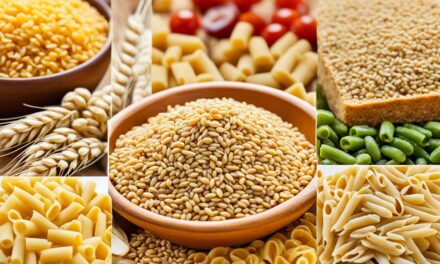Have you ever heard the phrase “chew your food”? It turns out, there’s more to it than just good manners. Recent research suggests that chewing your food more thoroughly may actually help you eat less and support weight loss. Yes, you read that right – by simply chewing more, you can potentially consume fewer calories and feel more satisfied after a meal.
Now, you might be wondering how this works. Well, when you chew your food, you’re not only breaking it down into smaller pieces for easy swallowing; you’re also kickstarting the digestion process. By chewing more, you allow your body to better absorb the nutrients from your food, resulting in more efficient digestion.
But that’s not all. Chewing more slowly has also been linked to a slower eating rate, which can have significant health benefits. When you eat at a slower pace, you give your brain more time to register feelings of fullness and satisfaction. This can help prevent overeating and lead to better appetite control.
So next time you sit down for a meal, take a moment to appreciate the importance of chewing. Pay attention to the texture of your food, savor each bite, and chew until it becomes small and soft enough to swallow easily. By adopting this mindful approach to eating, you can reap the surprising benefits of chewing and support your digestion and weight management goals.
Key Takeaways:
- Chewing your food more thoroughly can aid in digestion and support weight loss.
- Chewing slowly can help increase feelings of fullness and prevent overeating.
- Mindful chewing promotes efficient nutrient absorption and appetite control.
- Take the time to savor each bite and pay attention to the texture of your food.
- By incorporating mindful chewing techniques, you can enhance your eating experience and potentially consume fewer calories.
The Impact of Chewing on Digestion and Weight Loss
When it comes to digestion and weight loss, the simple act of chewing your food thoroughly can make a big difference. Not only does it help break down food into smaller particles for easier digestion and nutrient absorption, but it also triggers the release of digestive enzymes that aid in the overall process.
By chewing your food slowly and mindfully, you allow yourself to fully experience the flavors and textures while increasing feelings of fullness and satisfaction. This can lead to consuming fewer calories overall, supporting your weight loss goals.
Take a moment to savor each bite and focus on the process of chewing. Be mindful of your eating pace and chew until the food becomes small and soft enough to swallow easily. This mindful eating practice not only promotes better digestion but also encourages a healthier relationship with food.
The next time you sit down for a meal, remember that chewing is not just a means to an end but an essential part of the digestive process. Pay attention to your chewing techniques and embrace the benefits it can bring to your digestion and weight loss journey.
The Science Behind Chewing
Chewing your food more thoroughly has a significant impact on digestion and weight loss.
By breaking down food into smaller particles, chewing allows for easier digestion and absorption of nutrients in the stomach and small intestines. This, in turn, supports optimal nutrient uptake and overall digestive health.
During the chewing process, the action of your jaw triggers the release of saliva, which contains enzymes that initiate the digestion of carbohydrates. The more you chew, the more time these enzymes have to act on your food, leading to more efficient digestion.
Furthermore, chewing your food thoroughly allows your brain to receive satiety signals from your mouth and stomach, helping you recognize when you’re full and preventing overeating. By incorporating mindful chewing techniques into your eating habits, you can enhance your body’s natural ability to regulate appetite and support weight loss.
Mindful Chewing Techniques to Try
To make the most of your chewing process and support digestion and weight loss, consider implementing the following mindful eating tips:
- Slow down: Take your time while eating and chew each bite thoroughly.
- Savor the flavor: Pay attention to the taste, texture, and aroma of your food.
- Avoid distractions: Minimize distractions such as TV or smartphones during mealtime.
- Be present: Focus on the act of chewing and appreciate the nourishment your food provides.
By incorporating these mindful eating tips into your routine, you can cultivate a deeper connection with your food, improve digestion, and potentially achieve your weight loss goals more effectively.
The Relationship Between Chewing and Eating Rate
Your eating rate, or how fast you eat, has a fascinating connection to chewing. Studies have revealed that a quicker eating pace can result in consuming more energy and potentially lead to weight gain. On the flip side, a slower eating rate is often associated with better health outcomes and involves more thorough chewing. By taking the time to chew your food more thoroughly, you can slow down your eating rate, allowing you to be more mindful of your food and potentially consume fewer calories.
Furthermore, chewing your food for a longer duration has been found to increase the levels of gut hormones responsible for promoting feelings of fullness. This means that by dedicating more time to chewing, you can better control your appetite and support weight management. So next time you sit down to a meal, remember to chew consciously and savor each bite. It might just be the key to maintaining healthy eating habits and appetite control.
The Benefits of Chewing More
Chewing your food more has several benefits beyond digestion and weight management. Research suggests that chewing more may reduce feelings of hunger and lead to eating less overall. This may be because chewing influences appetite-regulating gut hormones. Chewing also allows for the breakdown of fats and proteins, making them easier to digest and absorb. Furthermore, chewing thoroughly promotes optimal digestion and nutrient absorption, supporting overall health. By focusing on chewing and being mindful of your food, you can experience these benefits and enhance your eating experience.
When you chew your food more, it not only supports the digestion process but also has a positive impact on your appetite control. Research shows that chewing more can help reduce feelings of hunger, allowing you to eat less and maintain a healthy weight. By thoroughly chewing your food, you activate the release of gut hormones that signal satiety, helping you feel fuller for longer periods. This can prevent overeating and promote a balanced eating pattern.
Chewing your food more also aids in the breakdown of fats and proteins. As you chew, the saliva mixes with the food, initiating the digestion process even before it reaches the stomach. The enzymes in saliva help break down carbohydrates, while the mechanical action of chewing breaks down fats and proteins into smaller, more digestible pieces. This means that when the food reaches your stomach, it is already partially digested, making it easier for your body to break down and absorb the nutrients.
Furthermore, chewing your food thoroughly promotes optimal digestion and nutrient absorption. When you chew properly, the food is broken down into smaller particles, which increases the surface area for enzymes to act upon. This enhances the breakdown of nutrients and allows for better absorption in the intestines. By chewing more, you ensure that your body can extract the maximum nutritional value from the food you consume.
“Chewing your food more can have a surprising impact on your overall health. Not only does it aid in digestion and weight management, but it also supports optimal nutrient absorption and can help reduce feelings of hunger. So, the next time you sit down for a meal, take the time to savor each bite and give your jaw a good workout!”
To summarize, the benefits of chewing more include:
- Reduced feelings of hunger
- Eating less overall
- Breakdown of fats and proteins
- Promotion of optimal digestion and nutrient absorption
By focusing on chewing and incorporating mindful eating habits, you can enhance your eating experience and support your overall health goals.
Mindful Chewing Tips
To make the most of the benefits of chewing, try incorporating these mindful eating tips:
- Take your time: Slow down and enjoy your meal at a leisurely pace.
- Pay attention to texture: Notice the texture of the food as you chew and savor each bite.
- Minimize distractions: Avoid eating while watching TV or using electronic devices.
- Practice portion control: Start with smaller portions and take breaks between bites.
- Engage your senses: Appreciate the flavors, smells, and textures of your food.
By adopting these mindful chewing techniques, you can optimize the benefits of chewing and cultivate healthy eating habits.
The Benefits of Chewing More
| Benefits | Description |
|---|---|
| Reduced feelings of hunger | Chewing more may help reduce hunger and decrease overall food intake. |
| Weight management | By eating less, chewing more can contribute to weight management and portion control. |
| Improved digestion | Thorough chewing enhances digestion and nutrient absorption. |
| Breaking down fats and proteins | Chewing properly helps break down fats and proteins for easier digestion. |
Tips for Mindful Eating and Chewing Techniques
Incorporating mindful eating and proper chewing techniques into your routine can help you get the most out of your meals. When you slow down and pay attention to what you’re eating, you can develop a healthier relationship with food and make more conscious choices. Here are some tips to practice mindful eating and improve your chewing techniques:
Savor the Flavors and Textures
Take the time to truly savor and enjoy the flavors and textures of your food. Notice the different tastes, aromas, and sensations in your mouth. Allow yourself to fully experience the pleasure of eating.
Put Your Cutlery Down Between Bites
Instead of continuously shoveling food into your mouth, try putting your cutlery down between each bite. This gives you a chance to pause, savor the food, and tune in to your body’s hunger and fullness cues.
Stay Present in the Moment
Avoid distractions while eating, such as watching TV or scrolling through your phone. Instead, focus on the act of eating and be present in the moment. This allows you to better connect with your body’s signals and enjoy the culinary experience.
Chew Each Bite Thoroughly
Take the time to chew each bite thoroughly before swallowing. Aim to break the food down into smaller pieces and make it easier for digestion. Chewing also releases digestive enzymes in your mouth, which aids in the digestion process.
Focus on Texture
Pay attention to the texture of the food you’re eating. Is it crunchy, creamy, or chewy? By tuning in to the texture, you can fully appreciate the sensory experience of eating and become more attuned to your body’s needs.
Choose Harder, Solid Foods
Opt for harder, more solid foods whenever possible. Foods that require more chewing can help improve your jaw strength and support oral health. Avoid processed or mashed-up options that don’t require much chewing.
By adopting these mindful eating and chewing techniques, you can improve your overall eating experience and lay the foundation for healthy eating habits. Remember, eating should be a mindful and enjoyable activity, not a mindless and rushed one.
Conclusion
So you’ve reached the end of this eye-opening journey into the world of chewing. Who could have imagined that something as simple as chewing your food could have such a profound impact on your eating habits and overall health? Well, now you know!
By taking the time to thoroughly chew your food, you can enjoy a multitude of benefits. Not only does chewing support proper digestion, but it also enhances feelings of fullness, leaving you more satisfied after a meal. And let’s not forget that chewing might just be the secret ingredient to aid in weight management. Who would have thought?
But it doesn’t stop there. To truly maximize the benefits of chewing, it’s important to incorporate mindful eating into your routine. Put down your fork between bites, savor the flavors and textures of your food, and be present in the moment. By doing so, you’ll not only enhance your digestion but also cultivate healthier eating habits.
So the next time you sit down for a meal, remember this: each bite is an opportunity for mindful chewing and a step towards a healthier and more satisfying eating experience. Embrace the power of your teeth, savor the taste, and chew your way to a healthier you. Bon appétit!
FAQ
Can chewing your food more help you eat less?
What are the benefits of chewing food?
How does chewing impact digestion and weight loss?
How does chewing relate to eating rate?
What are some mindful eating and chewing techniques?
Can chewing your food more support healthy eating habits?
MORE SOURCES TO READ:
- https://zoe.com/learn/how-many-times-to-chew-your-food
- https://www.ndtv.com/health/health-expert-luke-coutinho-tells-us-to-chew-food-slowly-know-why-is-it-important-for-your-health-1935480
- https://www.achieveyouraccent.com/blog/chewing
![]()














Recent Comments